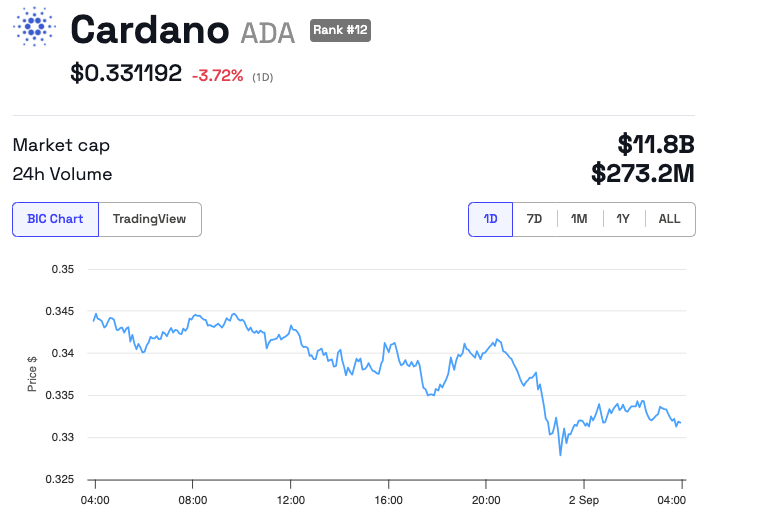FBI arrests Nigerian ‘tech queen’ Sapphire Egemasi in $1.3M heist targeting U.S. government
06/05/2025 - Updated On 06/17/2025
Cardano (ADA) has officially executed its Chang Hard Fork, ushering in a new era of decentralised governance. On Sunday, the governance of this $13 billion blockchain network began transitioning from its founding entities to its community of ADA holders. The Cardano community has highly anticipated this shift, which is expected to mark a major step towards true decentralisation in the cryptocurrency ecosystem.
According to officials, the Chang Hard Fork signifies a fundamental change in how Cardano will operate, with ADA holders now having the power to elect governance representatives and vote on crucial development proposals. This transfer of control is a direct response to the demand for greater transparency and community involvement in the decision-making process of blockchain networks.
The Chang Hard Fork is a major milestone for Cardano, representing a shift in governance and a broader movement towards decentralised control in the blockchain industry. As of the latest upgrade, ADA holders can influence the direction of the blockchain through three newly established, user-led bodies: the Constitutional Committee, Delegate Representatives (dReps), and Stake Pool Operators (SPOs). Previously, these powers were concentrated in the hands of Cardano’s three founding entities—the Cardano Foundation, Input Output Global (IOHK), and Emurgo.
Charles Hoskinson, co-founder of Cardano, has been vocal about this transition, recently stating, “The Genesis keys are dead.” This phrase marks the end of an era where decisions were made centrally and highlights the beginning of a more democratic governance model. According to the Chang Hard Fork’s outlined plan in Cardano Improvement Proposal CIP-1694, this change is part of a two-phase implementation strategy.
The first phase, currently live, features an Interim Constitutional Committee that will temporarily oversee governance. This committee’s role is to ensure a smooth transition as the rest of the governance framework is implemented, with the final governance bodies expected to be fully empowered within the next 90 days.

The Chang Hard Fork positions Cardano as one of the first major blockchains to fully embrace a token-based governance system. This shift heralds what many are calling the “era of Voltaire,” named after the Enlightenment thinker known for his advocacy of freedom of speech and expression. This period represents Cardano’s commitment to creating a self-governing, decentralised network that aligns with these ideals.
In an exclusive interview with BeInCrypto, Hoskinson revealed plans for “Cardano 2,” set to be unveiled in October. This new vision for the Cardano ecosystem will explore potential improvements and the future direction of the platform, including a focus on decentralised social networks and the integration of artificial intelligence (AI). “We’ve now gotten the protocol to a point where we can build applications that have the potential to change people’s lives,” Hoskinson said, hinting at a future where Cardano’s capabilities could extend far beyond traditional blockchain use cases.
Despite the excitement surrounding the Chang Hard Fork, the move towards decentralised governance is not without its challenges. Similar governance models, such as those employed by decentralised autonomous organisations (DAOs), have faced criticism for issues like bloated budgets and a lack of effective checks and balances. Some critics argue that decentralised governance could lead to power being concentrated in the hands of a few, undermining the very principles it seeks to uphold.
Interestingly, despite the transformative nature of the Chang Hard Fork, the market response was less enthusiastic. ADA’s price fell by 3.72% following the announcement, currently trading at $0.331192. This drop reflects broader market uncertainties and investor caution in the wake of such a significant shift. ADA has also fallen out of the top ten cryptocurrencies by market capitalisation, with its current price down 89% from its all-time high of $3.09 three years ago.

Nevertheless, proponents of the Chang Hard Fork argue that this is just the beginning. The potential for increased community involvement and the decentralised governance model could drive a resurgence in interest and investment in Cardano. As one community member, known as Cardanians, noted, “If the SEC wants to send a subpoena to someone from Cardano, they will have to address it to all ADA holders around the world. The three founding entities technically no longer have any control over Cardano.”
This statement underscores the potential regulatory advantages of decentralised governance, suggesting that it may be more challenging for authorities like the U.S. Securities and Exchange Commission (SEC) to categorise Cardano as a security. The decentralised nature of the new governance structure may provide a layer of protection against regulatory scrutiny that centralised entities often face.
In conclusion, the Chang Hard Fork represents a bold step forward for Cardano and the broader cryptocurrency landscape. By handing governance over to its community, Cardano is not only fulfilling its promise of decentralisation but also paving the way for a new era of blockchain governance. As the second phase of this transition unfolds, the world will be watching to see how effectively this new model operates and whether it can overcome the inherent challenges of decentralised governance.
The successful implementation of the Chang Hard Fork could set a precedent for other blockchain projects, signalling a shift towards a more participatory and democratic approach to governance in the crypto space. As Cardano continues to evolve, the lessons learned from this historic move will likely shape the future of blockchain technology for years to come.
Olivia Jackson is a US-based cryptocurrency writer and market analyst with a passion for decoding the complexities of blockchain technology and digital assets. With over five years of experience covering the crypto space, she specializes in breaking down market trends, regulatory developments, and emerging Web3 innovations for both retail and institutional audiences. Her work has appeared in leading finance and tech publications, including CoinDesk, Decrypt, and The Block, where she provides data-driven insights on Bitcoin, DeFi, and the evolving regulatory landscape. Olivia is particularly interested in the intersection of traditional finance and decentralized systems, often exploring how macroeconomic shifts impact crypto markets.